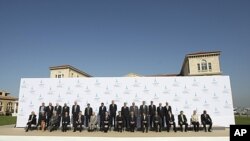International financial institutions have promised $38 billion more to four Arab countries trying to transition to democracy, nearly doubling a previous pledge.
French Finance Minister Francois Baroin announced the pledge Saturday at the second day of talks involving finance ministers and central bankers from the Group of Seven nations, plus Russia, in Marseille, France.
He said the $38 billion will be made available to Tunisia, Egypt, Morocco and Jordan from 2011 to 2013.
The pledge compares with $20 billion announced at a meeting of G7 nations, plus Russia, in May.
Separately, the International Monetary Fund said it will recognize the Transitional National Council in Libya as the country's official government. IMF chief Christine Lagarde told reporters of the decision Saturday in Marseille, paving the way for the council to benefit from IMF aid.
In other news in Marseille, German Finance Minister Wolfgang Schaeuble said he wants his deputy, Joerg Asmussen, to replace Juergen Stark on the executive board of the European Central Bank. Stark, who has been critical of the bank's bond purchases, resigned on Friday.
Officials from Libya, Egypt, Jordan, Morocco and Tunisia are explaining to G8 nations how they plan to launch their economies and hear what help they can expect from the world's major economic powers.
The Marseille discussions began one day after U.S. President Barack Obama addressed a joint session of Congress in Washington and proposed a $447-billion plan to ease U.S. unemployment, which stands at around 9 percent, and revive the economy. Since Mr. Obama took office in 2009, Republicans in Congress have rejected almost all of his economic proposals, objecting to increased spending and deficits.
Elsewhere, there are reports that Greece is about to default on its sovereign debt. Greek officials have denied them as speculation intended to hurt the euro. Last year, Greece received a $159-billion bailout from the IMF and European Union.




